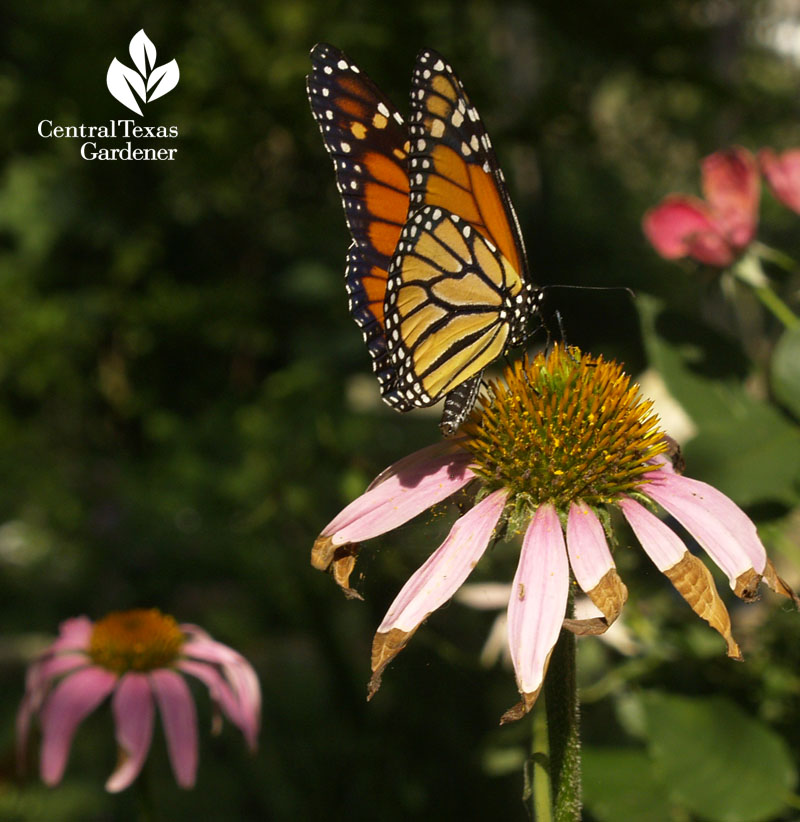May 3, 2012
Going a little wild
Here’s a good reason to plant native plants! This Monarch showed up for dinner on the coneflower. If it finds a date, maybe we’ll get eggs on our new milkweeds.

In the back “prairie” of my garden, I’m so thrilled that my Indian blanket (Gaillardia pulchella) seeds made it. I think I’ve finally found the sunny, well-drained spot to sow more next fall to up the ante from what they sow themselves.

In the “prairie,” butterflies are all over Gregg’s mist flower (Conoclinium greggii)–formerly Eupatorium–though eluding me at the moment.

When I dug up a long stretch of grass along the back fence years ago, my plant budget was smaller than my dreams. I planted just a few blue mist flowers to fill in fast.

Since then, I’ve been diversifying that space a few plants at a time. I’ve had to wrangle the exuberant mist flowers, since they do take over! But they’re easily divided to move around or share. I let them run a bit, though, since the butterflies love them so much.
In front, the butterflies thank my friend Holly for sharing a division of her Coreopsis lanceolata. In my mulched soil, it’s only seeded a bit, but I welcome each one.

In our latest lawn reduction project, I planted a few (on a budget) Texas frogfruit (Phyla nodiflora). They’re already going mad. Winecups are heading for the granite, too!

By fall, they’ll cover our granite with flowers to attract butterflies and other nectaring insects. Their leaves are larval food for the Phaon Crescentspot, Buckeye, and White Peacock butterflies.

Here’s a shot from Austin City Hall’s raised beds on the plaza; a testament to their endurance in hot spots. At my neighborhood’s former swimming pool, they covered the “grassy” spots, oblivious to full sun, heat, no water, and people camped out on their sun-bathing towels.

I love this Star thistle/American basket-flower (Centaurea Americana) from an Austin garden.

Not so long ago, the idea of actually using native plants in our gardens was sadly rare. For one thing, it was hard to find them in nurseries. Thanks to the Lady Bird Johnson Wildflower Center, we started asking for native plants and the growers responded. These days you can find groundcovers like Silver ponyfoot (Dichondra argentea) and Texas betony (Stachys coccinea), one that’s on hummingbird radars.

The Wildflower Center’s annual Gardens on Tour puts us one-on-one with native plants in garden settings. To spark your own designs, this week on CTG, Tom meets with Andrea DeLong-Amaya, Director of Horticulture at the Wildflower Center to preview this year’s May 12 tour.

Here’s just a sampling of what you’ll see.



Tour admission includes The Lady Bird Johnson Wildflower Center, too, for fabulous new designs like this.

The Wildflower Center is also hosting book signings and great activities for the kids! So, mark your calendars for May 12. Admission is $25 for all or $6 per garden. Find out more.
On CTG’s tour this week, here’s a sneak preview of one you can visit in person. We taped in December to illustrate the beauty of a native garden even in winter. On May 12, see it in spring glory and meet the gardeners, Lynne and Jim Weber, authors of Nature Watch Austin.
Although native plants don’t suffer from many ailments, now and then something gets them. This week, Daphne explains what happened to Joy Vera’s native winecups (and later, at the Austin TexasAgriLife office!) and what to do about it.

We thank Joy for sharing this with us, and we thank Dr. Ong, Extension Plant Pathologist from the Texas Plant Disease Diagnostic Lab for his analysis that confirms it is rust.
Shredded wood mulch isn’t the best thing for some plants, like winecups. So, this week, John Dromgoole compares a few mulch options for you.
This summer, go a little wild with whopper stopper Celosia! Thanks to Philip Leveridge from East Side Patch for Daphne’s Pick of the Week with his pictures and tips on his magic patch of Celosia spictata ‘Flamingo Feather’ .

Here’s another show stopper event! The Austin Area Garden Railroaders are hosting “Spring Bloom 2012 Garden Railroads Tour” on Saturday, May 5th, from 10:00 a.m. – 4:00 p.m. This free event features five railroad gardens. This is a total kick! Find out more.
See you next week! Linda
tags:

